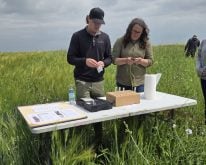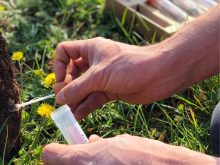WINNIPEG — Brazil is known for its rainforests, the statue of Jesus that towers over Rio de Janeiro and the Carnival festival, the biggest party on the planet.
In the world of agriculture, Brazil is known for soybeans and beef. But it’s also leading the pack in what may be the hottest area of innovation within agriculture.
“Brazil is the gold standard when it comes to biologicals,” said Manish Raizada, a University of Guelph plant scientist. “They have shown, across all crops I would say, the effectiveness of biologicals.”
Read Also

Government, industry seek canola tariff resolution
Governments and industry continue to discuss how best to deal with Chinese tariffs on Canadian agricultural products, particularly canola.
Data from Kynetec, a data and analytics company, indicates that sales of bio-pesticides are booming in Brazil. During the 2022-23 crop year, Brazilian farmers spent US$827 million on biological inputs, mostly bio-pesticides.
“In terms of area treated, biologicals were used in 33 percent of the planted area of soybeans, in addition to covering 50 percent of sugarcane … and 40 percent of second-crop corn,” Kynetec reported last year.
Total sales of biological inputs have surged in Brazil, going from US$338 million in the 2019-20 crop year to $827 million last year, Kynetec estimated.
Biological products in agriculture can be described as bacteria, fungi, plant extracts and other natural products that provide some vital function for the crop.
They typically fall into three categories: bio-pesticides, bio-fertilizers and bio-stimulants.
“They’ve had tremendous success with biologicals,” said Raizada, who speculated that bio-fertilizers could be more effective in Brazil because some of the soils are degraded.
Sugarcane is often grown on erodible and sandy soils, which have a high level of nutrient leaching.
If there’s minimal nitrogen in the soil, then biological nitrogen-fixing products “work great … in terms of adding nitrogen to the plants,” Raizada said.
In comparison, North American soils in the U.S. Midwest and the black soil zone of Western Canada are heavier and richer in nutrients. In those cases, a bio-fertilizer is less likely to deliver nutrients to the plant.
“If you have soil with nitrogen and you keep adding nitrogen to it, you’re going to shut off biological nitrogen fixation in a bacteria,” Raizada said.
In Brazil, data from Kynetec shows that most of the applied products are bio-pesticides used to control fungal pathogens, insects and soil nematodes.
About 70 percent of biologicals applied are bio-insecticides and bio-nematicides, Kynetec said in its market report for 2022-23.
This spring, the Sao Paulo Research Foundation held a conference with the University of Illinois in Chicago. During one of the sessions, a University of Sao Paulo researcher said the number of biological products registered for crop protection in Brazil is now larger than the number of agro-chemicals.
“There are currently nearly 629 biological products registered in Brazil for pest control, involving microorganisms, macroorganisms, biochemicals and semiochemicals,” José Maurício Simões Bento told agropages.com. (Semiochemicals are substances produced by organisms.)
Use of biologicals may be expanding in Brazil, but they represent only a fraction of the crop protection industry in the country.
In the 2022-2023 crop year, Kynetec estimated that Brazilian farmers spent $827 million on biologicals but $19 billion on chemical crop protection products.
Contact robert.arnason@producer.com


















